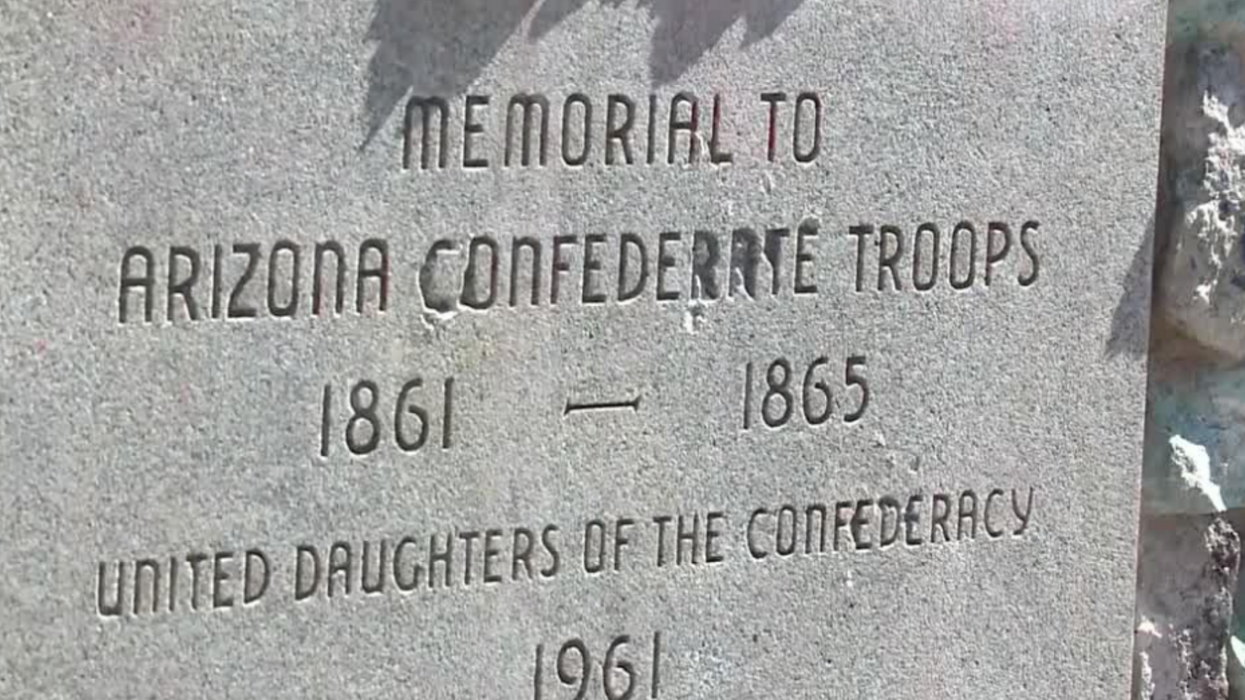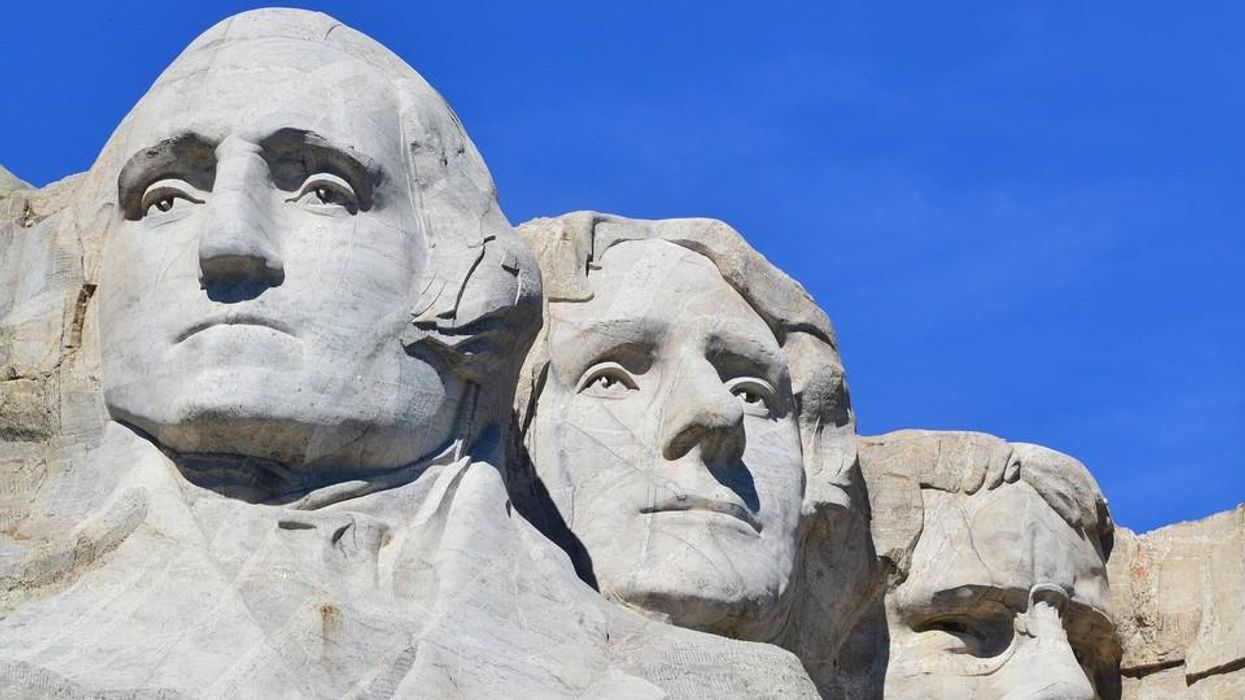True History: Arizona's Strict Abortion Ban Is A Relic Of The Confederacy
The 1864 Arizona law that was reinstated by a judge’s ruling on Friday bans all abortions except to save the life of the mother. Described in most reports as a law passed during the time Arizona was a territory, before it achieved statehood in 1912, one important fact has been omitted both from the judge’s decision and from the press reports on the draconian abortion ban: Arizona was a territory in 1864 all right, but it wasn’t a territory of the United States. The territorial legislature that passed the abortion ban did so on behalf of the Confederate States of America, into which Arizona was accepted when Jefferson Davis signed “An Act to Organize the Territory of Arizona” on January 18, 1862.
Arizona remained a territory of the Confederate states until the end of the Civil War in 1865, which means that the legislature that passed the exceedingly strict abortion law in 1864 was a legislature recognized by the Confederacy and loyal to it. The Arizona Territory sent horses, men, and supplies to the Confederate army during the Civil War and organized Company A of the Arizona Rangers, which was reconstituted into the Arizona Scout Company after several battles with the Union Army of California.
The Arizona Scout Company joined a Texas Cavalry Division in the Confederate Army under Major General Tom Green. The Arizona Scouts fought against the Union Army’s Red River Campaign and in the battle of the Sabine Crossroads and the battle of Pleasant Hill, when the Union attempted to occupy the capital of Louisiana, then located in Shreveport. The Arizona Scouts went on to serve under Confederate General John Wharton in Arkansas, fighting several skirmishes and small battles until General Edmund Kirby Smith surrendered all Confederate forces west of the Mississippi on May 26, 1865.
That’s how loyal the citizens of the Arizona Territory were to the Confederacy. They fought alongside Texans and gave their lives for the right to own slaves right up to the bitter end.
If you read Justice Samuel Alito’s decision overturning Roe v Wade, he runs down a list of states that had banned abortion as he tried to make the case that the United States had no “history and tradition” of legal abortion before the 14th Amendment was passed in 1868. The 14th Amendment, providing citizens with equal protection under the law, was one of the amendments to the Constitution on which the Roe decision relied. Among those states were Mississippi, Alabama, Georgia, and Louisiana, all states that had been in the Confederacy. Among them in banning abortion was Arizona, then a Confederate territory.
What’s the point of all this history? Well, I think it’s important to understand that many of the states that decided way back then to deny women the right to control their own reproductive lives also denied to their Black populations the right to control any part of their lives, as slaves.
Arizona recently passed a law banning abortions after 15 weeks of pregnancy which was due to go into effect on September 24. On September 23, however, a judge in Arizona decided that it is necessary to go all the way back to 1864 and reinstate a law passed by a Confederate territorial legislature.
Women who at least would have had the right to terminate their pregnancies in the first 15 weeks after conception are now banned from having an abortion at any time at all, including to remedy a pregnancy that is due to rape or incest. In cases involving a fetal condition which may endanger a woman’s life, the pregnancy must be endured until the point endangerment is actually reached. This means if a woman becomes pregnant with a baby suffering from anencephaly – a defect whereby the skull, brain and scalp do not completely form – or other conditions that can cause an early end to a pregnancy that endangers the life of a woman, Arizona demands that an abortion cannot be performed until an emergency is declared and an abortion becomes mandatory to save her life.
Under the terms of the 1864 law, anyone who performs an abortion or helps a woman obtain an abortion can be punished with up to five years in prison.
The decision by Arizona Judge Kellie Johnson threw the state into disarray, with arguments about which law should prevail – the 15-week ban which took effect last Saturday, or the draconian 1864 law. Arizona Governor Doug Ducey, who signed the 15-week ban, said the new abortion law would supersede the old law, but the state’s attorney general, Mark Brnovich, said he would enforce the Confederate-era total ban on abortions.
Democrats are set to seize the issue in the upcoming midterm elections. Secretary of State Katie Hobbs, a Democrat who is running for governor against Republican Kari Lake, came out against the abortion ban almost immediately. “We cannot let her [Lake] hold public office and have the power to enact extreme anti-choice policies that she’s spent her entire campaign touting,” Hobbs said at a press conference on Saturday alongside Democrat Kris Mayes, who is running for attorney general.
But Republican candidates for every major office in the state of Arizona were silent on the abortion issue Saturday. From Kari Lake, nothing. From Blake Masters, running for Senate against Democratic incumbent Mark Kelly, nothing. From Abe Hamadeh, the Republican running for attorney general, nothing. Previously, Lake has called abortion “the ultimate sin” and has called for a ban on abortion pills. Masters has termed abortion “demonic” and called for a federal fetal personhood law that would ban abortions in every state.
Lately, Masters has dropped references to the fetal personhood law from his campaign website and deleted a section in which he said he is “100 percent pro-life.” Lake has refused to comment on the reinstatement of the 1864 ban on all abortions.
Which side will prevail in the struggle over women’s rights in Arizona is up to the voters in November. Election of Hobbs as governor and Mayes as attorney general will certainly help. Mayes has said she will not enforce the Arizona ban on abortion and will direct county prosecutors to do the same. Hobbs says she will veto any further laws against abortion and push the Arizona legislature to overturn the 1864 total ban, but with Republicans in charge of that body, she doesn’t stand much of a chance. Alternatively, both candidates say they will support a ballot measure giving voters the opportunity to decide where Arizona stands on abortion in 2024.
For now, the Confederate-era ban on abortions in Arizona stands.
Lucian K. Truscott IV, a graduate of West Point, has had a 50-year career as a journalist, novelist, and screenwriter. He has covered Watergate, the Stonewall riots, and wars in Lebanon, Iraq, and Afghanistan. He is also the author of five bestselling novels. You can subscribe to his daily columns at luciantruscott.substack.com and follow him on Twitter @LucianKTruscott and on Facebook at Lucian K. Truscott IV.
Reprinted with permission from Lucian Truscott Newsletter




